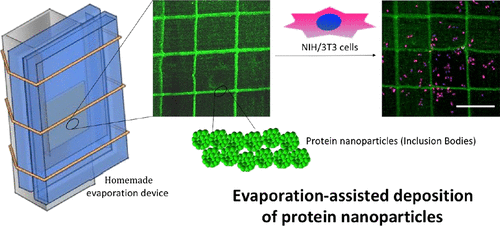Abstract
A versatile evaporation-assisted methodology based on the coffee-drop effect is described to deposit nanoparticles on surfaces, obtaining for the first time patterned gradients of protein nanoparticles (pNPs) by using a simple custom-made device. Fully controllable patterns with specific periodicities consisting of stripes with different widths and distinct nanoparticle concentration as well as gradients can be produced over large areas (∼10 cm2) in a fast (up to 10 mm2/min), reproducible, and cost-effective manner using an operational protocol optimized by an evolutionary algorithm. The developed method opens the possibility to decorate surfaces “a-la-carte” with pNPs enabling different categories of high-throughput studies on cell motility.
https://pubs.acs.org/doi/abs/10.1021/acsami.8b06821
